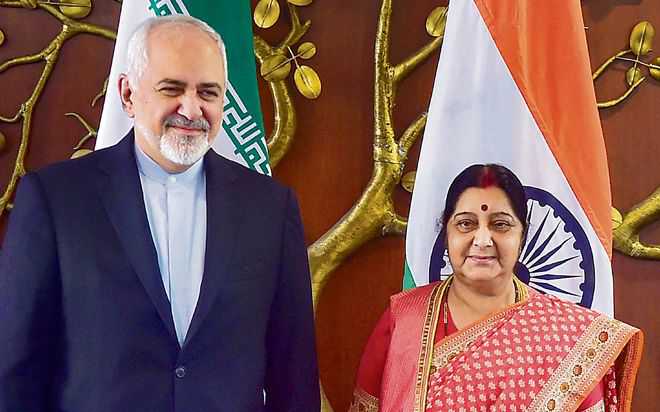
Clout: Iran is an important power in India’s extended neighbourhood with significant military capabilities.
Niraj Srivastava
Former ambassador
IRANIAN Foreign Minister Javad Zarif’s visit to India on May 14 and his talks with Sushma Swaraj again present India with a difficult choice: Implement US sanctions against Iran by stopping the import of Iranian oil or continue to deal with Iran on the basis of international law and India’s national interests. The choice is not an easy one: on the one hand are India’s relations with the US, while on the other its economic and geopolitical interests. Various considerations can have a bearing on this issue.
First, India’s economic and geopolitical interests. Iran is the third largest exporter of oil to India, after Iraq and Saudi Arabia, currently accounting for a little over 11 per cent of India’s oil imports. Iran is also India’s gateway to Afghanistan and Central Asia through the port of Chabahar, which India has helped to develop. India’s stakes in its relations with Iran are high, also because Iran has scrupulously adhered to the nuclear deal (also known as the Joint Comprehensive Plan of Action, or JCPOA) reached by the US and other countries in 2015.
Second, it is clear that Iran has not violated any norm of international law in its dealings with the US and other world powers. Moreover, all signatories to the nuclear deal, including US allies such as Britain and France, have opposed America’s unilateral withdrawal from the deal about a year ago. Iran’s adherence to the deal does not seem to have pacified the US, which reimposed sanctions against that country last November. It is now asking other countries too, including India, to do so.
Third, the sanctions have begun to hurt the Iranian economy seriously and will cripple it if India and some other countries stop buying oil from Iran. India’s investment in the Chabahar port could also come under a cloud, jeopardising its geopolitical interests. Instability in the Gulf will increase if Iran, too, begins withdrawing from the JCPOA, which it is likely to do if the US continues to proceed on its current trajectory.
Fourth, reimposition of US sanctions against Iran is not sanctified by the UN, and thus not binding on other countries in terms of international law. In the past, India has taken the stand that it is not under any obligation to implement any measures against any country that are not authorised by the UN.
Fifth, it is not in India’s interest to become an instrument of the US foreign policy, particularly if it involves committing an act illegal in terms of international law. The US is a global power with global interests, in the pursuit of which it has often embarked on highly dubious ventures. The 2003 US invasion of Iraq, the 2011 NATO bombing of Libya, and the ongoing regime-change adventure in Syria are some recent examples.
If India capitulates under US pressure on Iran, it could likely be called upon by the US to take more such steps in the future. That would not be in India’s interest; it would not like to become a camp-follower of the US or any other country. It should stay on the right side of international law and preserve its strategic autonomy.
Sixth, Iran is an important power in India’s extended neighbourhood with significant military capabilities. It has good relations with India. It is capable of disrupting the flow of oil through the Straits of Hormuz. The price of oil would rise significantly if that were to happen, which, in turn, would have an inflationary effect on India’s economy.
Finally, instability in the Persian Gulf could also adversely affect the eight million-strong Indian expatriate community in the region.
Zarif visited India — after trips to Beijing and Moscow — against the background of deteriorating US-Iran relations. In the past couple of weeks, the US has moved an aircraft-carrier strike group, B-52 bombers, and Patriot missile batteries to the Gulf. American media has reported plans to deploy 1.2 lakh troops in the region. US officials have also accused Iran of orchestrating attacks on two Saudi oil tankers in the Gulf, and ordered the evacuation of all non-essential staff of the US embassy in Baghdad.
Some observers believe that any US military action against Iran will be counterproductive; in all probability, it will unite the Iranian people behind their government, making a regime change highly unlikely.
It has been pointed out that in the recent past, the US has generally picked ‘soft targets’ for attack, which were militarily weak, had no major allies, and did not possess weapons that could deter armed action. US action against Iraq (2003) and Libya (2011) falls in this category.
The above criteria do not apply to Iran. It has around 400 naval assets, and ballistic and cruise missiles of various ranges. It could use these to disrupt the flow of oil through the Straits of Hormuz. One-fifth of the world’s traded oil passes through this narrow passage, including 90 per cent of Saudi oil.
Also, if the US attacks Iran, other powers, especially Russia, are not expected to watch from the sidelines. While not confronting the US directly, Russia might supply weapons to Iran, which already has advanced Russian weaponry in its arsenal, including the S-300 air defence system.
These are the considerations the new government of India will have to weigh before taking a decision regarding oil imports from Iran. As things stand, the chances of US military action against Iran are less than 50 per cent. But that could change.
In either case, the balance of India’s interests appears tipped in favour of continuing oil imports from Iran. That should not be weighed in a transactional manner against US support for India over the Masood Azhar issue. In the past few years, India appears to be emerging as a ‘swing state’ in international politics. It should act in a manner that strengthens that role.



























